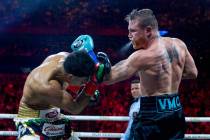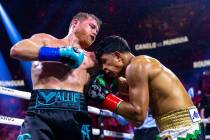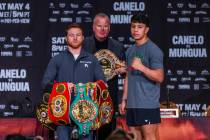Douglas’ knockout of Tyson still one of biggest upsets in sports history
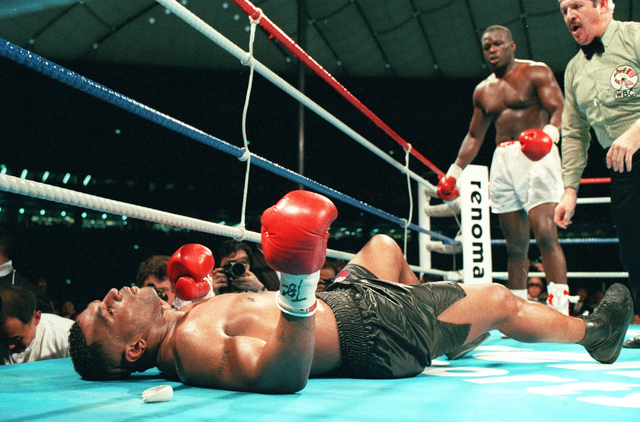
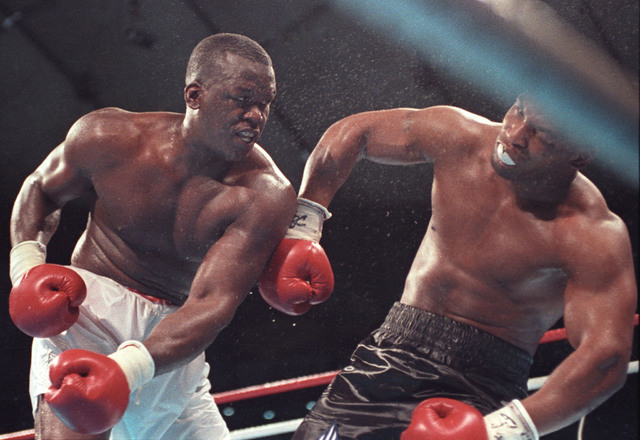
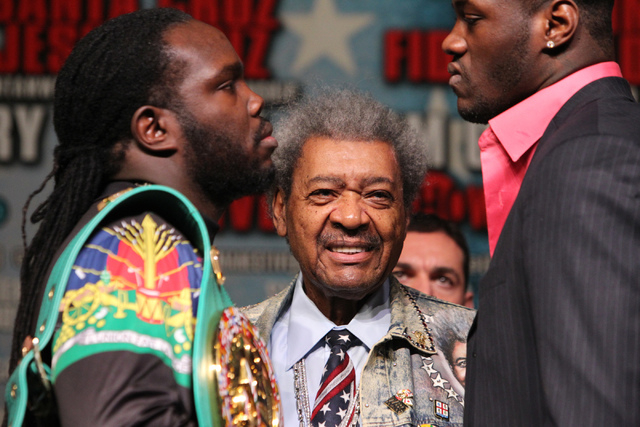
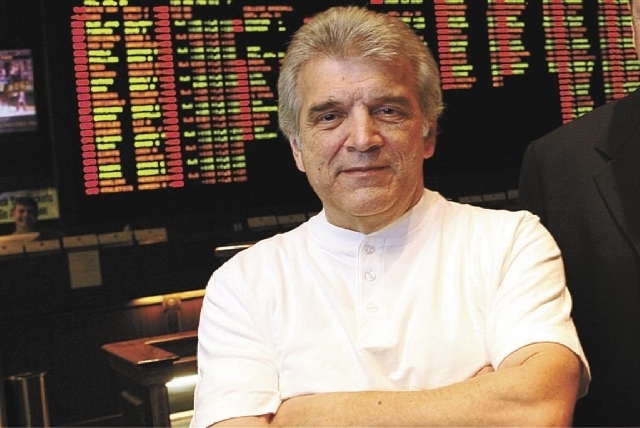
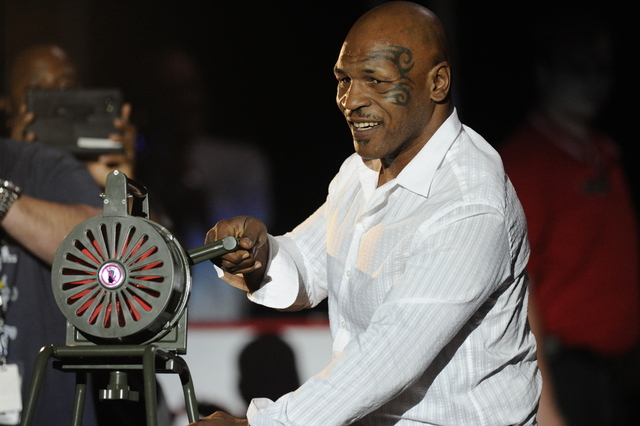
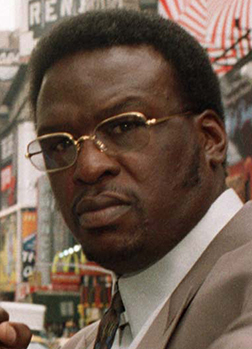
“Suddenly, Mike Tyson, perceived as this great monolith, has been reduced to another heavyweight champion who has been defeated.”
— HBO boxing commentator Larry Merchant
The image remains indelible in the minds of sports fans.
Mike Tyson, then the undisputed heavyweight champion of the world, the self-proclaimed “Baddest Man on the Planet,” lay helpless on the canvas in a boxing ring in a baseball stadium in Tokyo, having been counted out by referee Octavio Meyran as James “Buster” Douglas, a relative unknown from Columbus, Ohio, jumps up and down with his hands high above his head in celebration, having just pulled off one of the most shocking upsets in sports history.
Feb. 11, 1990. Twenty-five years ago on Wednesday.
Douglas, a 42-1 long shot, dominated the first seven rounds and seemed to be in control in the eighth. But suddenly, Tyson unleashed a vicious right uppercut that caught Douglas flush on the jaw, sending him to the canvas. Meyran picked up the count from the timekeeper and Douglas barely beat it, surviving the round as the bell sounded.
Many thought he was finished.
But he came out and dominated the ninth round. Tyson’s left eye was almost swollen shut by that point, and his corner was unable to control the swelling.
In the 10th round, Douglas staved off an initial flurry from Tyson, then countered with six straight left jabs to set up his own right uppercut that staggered Tyson. Douglas followed with a three-punch combination that sent Tyson to the mat for the first time in his career.
He never got up as Meyran counted to 10, then stopped the fight at 1:22 of the round, leaving a bewildered and battered Tyson with the first loss of his career — and a Tokyo Dome crowd of 40,000 and HBO audience in utter disbelief at what they had just witnessed.
Douglas’ win was the biggest upset ever in the heavyweight division and perhaps in boxing history. Some of those involved recall that Sunday in Tokyo (Saturday night in the United States).
THE CHALLENGER
The kids won’t be in the gym that he helps run in Columbus, Ohio, for a couple of hours, so Buster Douglas has time to reminisce.
“It was the greatest night of my life,” he said. “I was well-prepared. We trained well, and even my mother’s death didn’t distract me.”
Lula Pearl suffered a stroke and died 23 days before the fight. There had been speculation Douglas would pull out of the fight. Instead, he stayed in the gym and maintained his preparations for Tyson.
“My mother was a strong woman,” Douglas said. “She wanted me to win the title, and she didn’t want her situation to affect me. She was already sick when we got the fight, so I knew what was going on with her.
“So after she died, I stayed in the gym. I knew this was my chance, and I didn’t want to let it slip away from me.”
As the bell rang for the first round, Douglas went right after Tyson, who normally employed similar tactics against his opponents. But unlike other Tyson foes, Douglas wasn’t intimidated.
“Why should I have been? I’m bigger than him,” said the 6-foot-4-inch Douglas, who weighed in at 231½ pounds to 220½ for the 5-10 Tyson.
And when Douglas’ stinging left jab found its target in the first round, he came back to his corner after the first three minutes knowing he could win.
“He wasn’t fighting back,” Douglas said. “So I just kept doing what I was doing. I was letting my hands go, just like my father used to tell me when I first started boxing. At that point, my confidence had grown. I knew I was going to beat him.”
It wasn’t until late in the eighth round that Tyson responded, doing so with that big right uppercut that knocked Douglas down but not out.
“He didn’t hurt me,” Douglas said. “I took that shot pretty well. But I was aware of what was going on.”
After the fight, Tyson’s promoter, Don King, complained that Meyran had given Douglas a “long count” and tried — but failed — to have the result voided.
“The ref did his job,” Douglas said. “There was no long count. For them to still complain about it 25 years later shows they’re little babies crying.”
Douglas said the knockout heard around the world was a matter of seizing the opening.
“I knew he was already hurt and that he couldn’t see out his left eye,” Douglas said. “So when I threw those jabs at him, I don’t think he ever saw the (right) uppercut. And then I was able to throw those three punches after and finish him off. I knew he wasn’t getting up.”
And after having accomplished his dream of becoming heavyweight champion, Douglas went back to his hotel and celebrated with his corner men. No big entourage. No fancy victory party. Just a guy with a belt around his waist and a beer in his hands.
“That was the best part, to celebrate with the people who got you there,” Douglas said. “Good friends are hard to find.”
THE CHAMP
When Mike Tyson agreed to face Buster Douglas, he was riding the crest of a wave boxing hadn’t seen in a long time. He was 37-0 with 33 knockouts. He was just 23 years old. He had become one of the most captivating people in sports.
Douglas had fought on several of Tyson’s undercards, so Tyson was familiar with him. Obviously, he wasn’t particularly impressed or concerned about Douglas’ abilities and perceived their fight as an easy payday.
But there were warning signs that Tyson was in trouble before he entered the ring in Tokyo. He wasn’t training as seriously as he normally would. He wasn’t doing his roadwork. He got knocked down by Greg Page during a sparring session a couple of weeks before the fight. And when he arrived in Japan, his focus apparently wasn’t on the fight.
Tyson turned down numerous requests to be interviewed for this story. But he told Playboy magazine in its February edition that his heart wasn’t into the fight.
“I came close to pulling out of the Buster Douglas fight,” he said. “I didn’t want to train. I was 23, and I wanted to party and have fun.”
But Tyson kept the date, and when the opening bell rang, everyone expected him to charge to the middle of the ring and start throwing those lethal hooks.
Instead, he found himself the recipient of the majority of the blows, as Douglas quickly established the left jab and established himself as the aggressor.
“He threw good punches, but he didn’t have a devastating punch,” Tyson told Playboy. “He never had me hurt until the very end of the fight. I knew at any moment I was going to hit him and he’d probably be going down or something.”
That’s what happened late in the eighth round, when Tyson’s right uppercut sent Douglas to the canvas. Like King, Tyson thinks Meyran was slow with his count and that Douglas should have been knocked out.
Instead, the fight continued, and two rounds later, it was Tyson who was counted out.
THE PROMOTER
Don King had taken over the handling of Tyson from Bill Cayton in 1988. King was comfortable around heavyweight champions. He had worked with Muhammad Ali and Larry Holmes. And as Tyson’s fight in Tokyo was nearing, King was concerned.
“I think he was training on the wrong thing,” said King, noting that Greg Page had knocked down Tyson during a sparring session. “Mike was out in the clubs. But I still thought Mike would win the fight.
“In my mind, Mike was the only one who could beat Mike,” added King, who was in the ring before the opening bell waving an American flag in one hand with an unlit cigar in the other.
As the fight progressed, King could sense trouble. Tyson wasn’t throwing those big punches. Then, near the end of the eighth round, he finally unleashed one that sent Douglas to the canvas.
Douglas beat the count of 10 and the bell sounded to end the round. King was infuriated by what he had just seen and feels the same way 25 years later.
“Tyson was the victim of a long count, just like (Jack) Dempsey and (Gene) Tunney,” he said.
Then came the 10th round. And as Tyson struggled to regain his bearings and the count headed toward 10, King was helpless — and perhaps speechless for the first time in his life.
“I couldn’t believe what I was seeing,” he said. “I couldn’t believe it was Tyson laying down there. It was history in the making.”
THE SPORTS WRITER
Ed Schuyler Jr. covered boxing for The Associated Press and had seen his share of great fights over the years. When he arrived in Tokyo for Tyson-Douglas, there was nothing that led him to believe Tyson would lose.
“Even though Tyson didn’t look good in his last fight (a first-round technical knockout of Carl Williams) and Douglas didn’t look good in his last fight, I still didn’t see Tyson losing, even though he had a lot of distractions and looked like he had dieted the weight off instead of training it off,” said Schuyler, now retired and living in Bloomsberg, Pa. “But I made the mistake of judging a fighter on his last fight, and by the fifth or sixth round, I started thinking Douglas could win.”
Schuyler didn’t write his fight-night stories on a computer or a typewriter. He would dictate what he saw to someone on the AP’s copy desk in New York. And when Tyson knocked down Douglas in the eighth round, Schuyler, like most everyone else, figured it was just a matter of time before the champ finished off the challenger.
But Tyson had absorbed a lot of punches by then, and his left eye was virtually shut and his corner was unable to control the swelling.
“He had the Three Stooges in his corner, and they were using a condom, or at least it looked like a condom, with ice to try to stop the swelling,” Schuyler said. “They had no idea what the hell they were doing.”
Schuyler said Tyson-Douglas was a sports writer’s dream.
“It was a good fight with an exciting and controversial ending,” he said. “I’d say it was the biggest upset in boxing history.”
Schuyler also wanted to clear up a quote that has been attributed to him over the years. The story goes that he arrived in Tokyo, and as he was being processed through customs, he was asked what business he had in Japan. Schuyler said he was there to cover a boxing match, and when the agent asked him how long he expected to be working in the country, he reportedly replied, “About 90 seconds.”
The “quote” managed to make it into the HBO telecast. Only thing is, Schuyler never said it.
“That’s a joke I made later on, but I never said it to the customs guy, though looking back, I wish I had, because it is a good line,” he said. “I think I said something to Earl Gustkey of the L.A. Times about it, and next thing I know, HBO is using it.”
THE ANNOUNCER
Jim Lampley had been calling boxing for about four years when he flew to Tokyo to call Tyson-Douglas on HBO. He admitted to still being relatively new to the sport, but with veteran sports writer Larry Merchant and future Hall of Fame fighter Sugar Ray Leonard working with him, he knew he was in good company.
“I think we were all swept up in the mismatch and romantic trappings of Mike,” Lampley said. “I certainly overlooked some things. But I’ve said this many times — if you put all the struggles Buster had aside and all the issues Mike had with Quick Tillis, Mitch Green and Jose Ribalta, all of them who were taller fighters with a jab, Buster was better than all of them.
“When you look back on it, it wasn’t such a shock. But back then, it was.”
As Lampley prepared to call the fight, he had something in the back of his mind: his flight back to the United States that day. If Tyson did what everyone expected and knocked out Douglas early, no sweat. He makes his Singapore Airlines fight easily.
But as the rounds dragged on, Lampley started growing concerned.
“I was wondering if we were going to wind up missing the flight,” he said.
With Douglas dominating through seven rounds, Lampley told the TV audience: “We’re in the eighth round, folks; a heavyweight champion regarded as completely invincible in these circumstances is in big trouble.”
And moments before Tyson’s right uppercut knocked down Douglas, Lampley said: “Can you imagine Buster Douglas as the undisputed heavyweight champion of the world? It boggles the mind!”
Then, when Tyson was knocked out, there were no histrionics out of Lampley. He said, somewhat matter-of-factly, “Mike Tyson has been knocked out.”
“I didn’t plan it to be that way, but the truth is, the crowd had been so quiet throughout the fight that by the time we reached the 10th round, it was as though we were calling a golf tournament,” Lampley said. “I had never seen such an understated crowd at a sporting event, much less a boxing match.”
As the fight ended, Lampley, Merchant and Leonard were hustled out of the Tokyo Dome, whisked to the airport and made their flight. By early afternoon, Lampley was back in Los Angeles, where he was to attend an awards show, as well as do two sportscasts for the CBS affiliate he was working for.
“I had no knowledge of the controversy and the protest by King over the knockdown in the eighth,” Lampley said. “I never thought it was going to be part of any controversy. He knocked him down. He got up. And on we go to Round 9.”
Lampley, who will be inducted into the International Boxing Hall of Fame in June, said Feb. 11, 1990, was the most important date of his boxing broadcasting career.
“When you ask me what resonates about that day 25 years later, everything does,” Lampley said. “It’s the most important fight I ever called. It’s the biggest upset in boxing history.”
THE BOOKIE
At the time of Tyson-Douglas, Jimmy Vaccaro ran the race and sports book at The Mirage, Steve Wynn’s newest hotel-casino that opened in November 1989. Vaccaro, who grew up in Pittsburgh, knew a lot about the fight business.
“I grew up a fan of boxing,” said Vaccaro, now an oddsmaker at the South Point race and sports book. “I loved being around it.”
But when the fight was made, Las Vegas sports books were tepid about setting a line. It was considered such a mismatch that oddsmakers feared they wouldn’t get enough two-way action to reduce the amount of exposure to the house.
“Nobody thought Douglas had a chance,” Vaccaro said. “So the question was, ‘What do you make the line?’ My initial instinct was to make it 12-1, but I realized we’d get killed with Tyson money. So I made it 27-1. Right away, someone bet $54,000 to win $2,000, so I upped it to 32-1. A guy from California comes in and bet $93,000 to win $3,000.
“I can’t find anyone willing to take Douglas. So now, I make it 37-1, and it stayed there for a while. I think one guy bet $1,000 on Douglas. Now it’s three weeks before the fight, and I said we’re going to 42-1. The night of the fight, it’s still 42-1. I’m getting $100 here, $200 here on Douglas, but pretty much everything is on Tyson. Two days before the fight, a guy comes in and bets $126,000 on Tyson.”
The fight wasn’t shown at The Mirage, so Vaccaro had to follow it on a ticker in the sports book. That’s how he found out Douglas had knocked out Tyson.
“When we saw the ticker, we didn’t pay off right away because we wanted to make sure the right guy won,” Vaccaro said. “A couple hours later, we verified it, and I went home and went to bed. We wrote about $1.8 million on the fight, and we wound up coming out $104,000 ahead, so it worked out well for us.”
Vaccaro had no idea how well until his phone rang around 2 a.m. It was someone at the hotel. He had a ton of messages from media outlets around the world, journalists wanting to talk with him about booking bets on the huge underdog that was Douglas.
“I got down there in like 15 minutes, and we basically turned the sports book into a television studio,” Vaccaro said. “We did “Good Morning America.” The “Today” show. I did a ton of newspaper interviews.”
He also generated unprecedented exposure for the hotel. The next day, Wynn called Vaccaro and said he wanted to see him immediately.
“I’m going up the elevator and I’m thinking, (expletive), I’m going to get fired,” Vaccaro said. “I’m trying to figure out what I did wrong.
“So I go into Steve’s office, and he’s sitting in that big chair of his, and he looks right at me and says, ‘What the hell are you doing back there in the sports book?’ And I said, ‘I don’t know, Mr. Wynn.’ And he puts his hand on the side of his head and says, ‘Just keep doing what you’re doing.’ ”
THE AFTERMATH
Tyson’s life spiraled out of control after the loss to Douglas.
In 1991, he was arrested on a charge of raping a Miss Black America pageant contestant. He was convicted in 1992 and spent three years in an Indiana prison.
He returned to the ring in 1995 and regained the heavyweight title in 1996 before losing it to Evander Holyfield in November of that year at the MGM Grand Garden.
In their rematch in June 1997 at the MGM Grand Garden, Tyson bit Holyfield’s ear twice during the fight and was disqualified. He was fined $3 million and had his license revoked by the Nevada Athletic Commission for one year.
Tyson returned to the ring in 1999 and fought until 2005 before retiring after back-to-back losses to Danny Williams and Kevin McBride. His record was 50-6 with 44 knockouts, two no contests and one disqualification.
But Tyson ultimately regained control of his life. He remarried in 2009, his third marriage, and had a successful one-man play of his life on Broadway.
He has returned to boxing as a promoter of Iron Mike Productions. Most recently, he has worked as the producer of a successful TV cartoon show. Now 48, he lives in Las Vegas.
Douglas cashed in on his success in Tokyo, with Wynn signing him to an exclusive two-fight deal worth $60 million. But in his first fight after Tyson, Douglas lost to Holyfield on Oct. 25, 1990, in a specially constructed outdoor arena at The Mirage. His reign as heavyweight champion lasted less than nine months.
After that fight, Douglas lost interest in the sport. His weight ballooned to almost 400 pounds, and at one point, he was hospitalized after going into a diabetic coma.
He returned to the ring in 1996 and fought nine times before retiring for good in 1999 with a 38-6-1 record and 25 knockouts. Now 54, he lives in Columbus and works in a youth boxing program. He says his diabetes is under control and he loves his life.
“Working with these kids, it’s as if I’ve come full circle,” Douglas said. “I love coming to the gym and helping these kids.”
And reminding them that anything is possible. Feb. 11, 1990, is proof of that.
“I’m so blessed,” Douglas said. “I’ve had some disappointments in my life after winning the title. But my place in history is secure. Nobody can take that away from me.”
Contact reporter Steve Carp at scarp@reviewjournal.com or 702-387-2913. Follow him on Twitter: @stevecarprj.
















